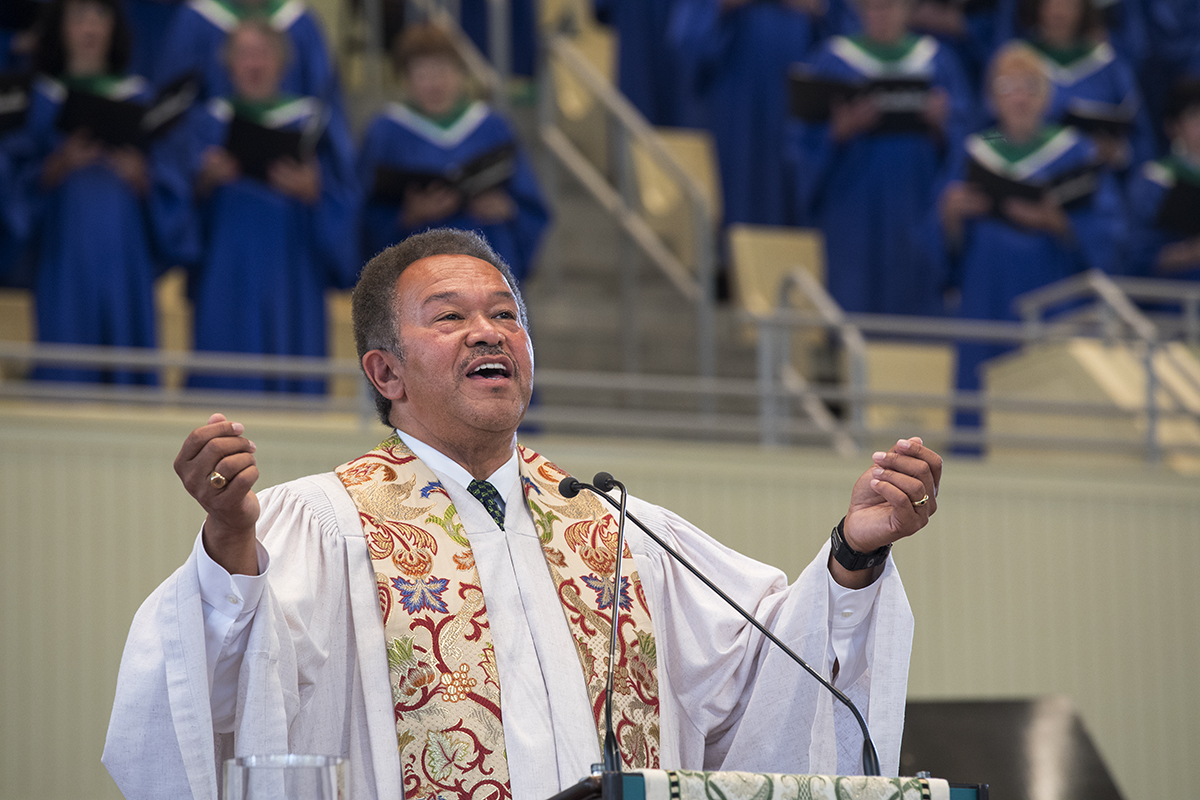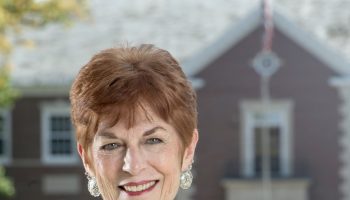In Matthew 28:16-20, Jesus gives a final decree to his disciples before leaving them. He tells them to go out and teach all nations.
Before he goes, though, Jesus says, “I am with you always, even unto the end of the world.” It is with this Scripture that the Rev. Robert M. Franklin Jr. will depart from Chautauqua Institution after leading morning worship at 10:45 a.m. Sunday in the Amphitheater, with a sermon titled “Memory, Presence, Partnership.” Franklin is leaving behind a legacy of generosity, a decree to keep moving forward and many grateful colleagues.
“He’s juggled many things in his life to be here, and I’m very grateful for that,” said Maureen Rovegno, associate director of religion. “I’m just grateful for his generous spirit.”
Franklin has spent four seasons as the director of the Department of Religion at the Institution, but his history with the community goes back 17 years, to when he first spoke on the morning lecture platform. He said he felt a “kind of magic” that drove him to return as a speaker, and again as theologian-in-residence in 2005.
By 2014, Franklin had an awareness and appreciation for the complexity of Chautauqua, explained Tom Becker, former president of the Institution.
Becker said Franklin, with his experience in major administrative roles at Morehouse College and deep understanding of Chautauqua, was the perfect fit for the job that former director of religion, Rev. Joan Brown Campbell, was leaving.
“The balance between being as intellectually sharp and trained as he is and being empathetic enough to be a pastor to a community isn’t a combination that grows on trees,” Becker said.
That intellectual rigor and empathy is part of the legacy that Franklin said he hopes to leave behind. Although Franklin said the religion programming has always been top — notch, Rovegno and Becker both said Franklin’s passion for theological scholarship was a key aspect of his tenure.
Franklin has taught religion and theology at universities across the country, among many other accolades. He is currently the James T. and Berta R. Laney Professor in Moral Leadership at Emory University, which is where he will be expanding his work after leaving the Institution.
All of his knowledge of theology, however, would not mean much if Franklin couldn’t apply it. He did that by being a living example of moral leadership, which he strongly advocated for among Chautauquans.
“I define moral leaders as people who lead with integrity, courage and imagination,” Franklin said. “They are focused on serving the common good.”
Franklin put moral leadership at the forefront of Chautauquans’ thinking, Rovegno said, and made it even more relevant because he modeled it. He put the needs of the community first and made generous sacrifices to be at Chautauqua for three years, though his family remains in Atlanta full-time.
Cheryl Franklin, Franklin’s wife, said they had a lengthy discussion about how the job would fit into their family life. Ultimately, however, they knew that Chautauqua was where Franklin needed to be. She said she didn’t even consider the arrangement to be “hard,” rather simply “logistically challenging.”
Early in his tenure, Franklin said part of his vision of being a moral leader — and part of why he needed to be at Chautauqua — was to address diversity in a place that was already facing so many other issues head on.
Becker said he did not hire Franklin to be the “chief diversity officer,” but it is undeniable that Franklin is the only person of color in the upper levels of the Institution administration. The result has been that Franklin has had to educate others about racial issues and also listen to everyone who wanted to talk about them, which he said has been one of the biggest challenges of his tenure.
This has only gotten more difficult in light of disturbing events unfolding outside the gates, including those in Charlottesville, Virginia, earlier this month. Franklin led a vigil to give Chautauquans a place to share their feelings about the protests, and both white and black members of the Chautauqua community came forward to speak.
“If there were more African Americans and other people on staff, there would be more people to engage,” Franklin said. “When you’re the only person of color, you kind of carry a disproportionate load.”
Franklin said he hopes his work with the African American Denominational House, a group on the grounds that represents the African-American community, will be continued and built upon. It could help build a bridge between Chautauquans and African-American people of faith, he said, which is a positive change in divisive times.
Ultimately, Franklin said, change will have to come from the Institution, not just from a word-of-mouth movement. This could involve building up Franklin’s vision of a house dedicated to Martin Luther King Jr., or hiring a diversity officer.
David Lollis, president of the Chautauqua Denominational Association, said Franklin’s efforts have already done important work, though it may be hard to tell from appearances. Although many people think having a house for the group would be ideal, Lollis said it is expensive. He points to the AADH’s successful programs, which have been packed with attendees, as a better indication of achievement.
Franklin’s willingness to talk to anyone, at any time, about important issues like race left a mark on Chautauqua. Lollis said Franklin’s ready smile and approachable demeanor in public set a welcoming tone for the Department of Religion, which has made it more accessible for outsiders and the nonreligious.
“Robert has seen that Chautauqua is one place where we can bring together people to really look at the changing world of religion, and the changing world of church, and figure out a way to have people go home with new insight,” Lollis said.
With this renewed focus has come renewed energy in the Department of Religion. Rovegno will succeed Franklin in the role of director of religion, but a new position — vice president and senior pastor — will be filled by the Rt. Rev. V. Gene Robinson. This will elevate the status of the department to the executive level and bring religion to an equal standing with the other programmatic pillars of Chautauqua. Both appointments are effective Sept. 1.
Franklin will continue the kind of work he’s done at Chautauqua in his new roles in the classrooms and halls of Emory University. Just as he will address in his sermon on Sunday, departure involves not only remembering but also also knowing that even while apart, he and the Institution will continue to work on the same great project.
“I think I have a stronger conviction about what we call the ‘mix’ at Chautauqua,” Franklin said. “I won’t find that anywhere else. I’ll always come back here for that.”
The features of Franklin that need to be experienced in person — his voice, his presence, his humor — will be sorely missed by many, though. People will have to wait patiently for his return to the halls of Chautauqua and heed his advice given at the end of his Final Benediction on Sundays.
“Blessed are the flexible,” Franklin often says, “for they will never get bent out of shape.”
Staff writer Ryan Pait contributed to this report.





